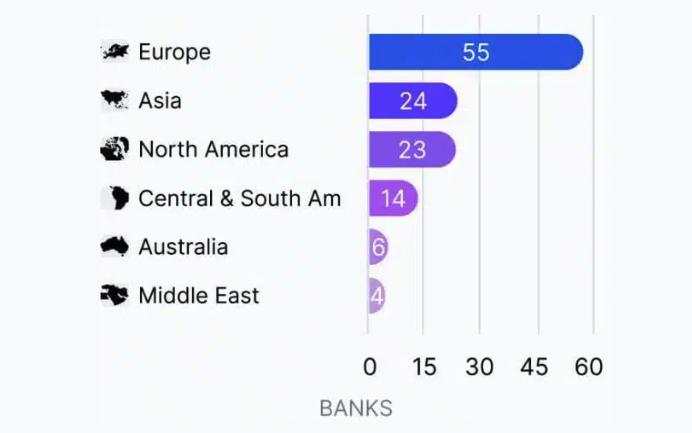Europe is currently considered the world leader in the number of crypto-friendly banks. These banks provide services related to cryptocurrencies such as custody, trading, conversion from fiat to crypto, or support for businesses in this field.
The development of a legal framework for cryptocurrencies is the reason behind this boom in Europe.
The rise of crypto-friendly banks in Europe
A Coincub study found that there are up to 55 banks in Europe that have integrated cryptocurrency-related services. Germany recorded six banks, while the UK had 5. Countries like Switzerland, Liechtenstein, and Lithuania also have pioneering banks in this field.
 Europe leads in crypto-friendly banks. Source: Coincub
Europe leads in crypto-friendly banks. Source: CoincubSome notable names include SEBA Bank (Switzerland), Bank Frick (Liechtenstein), Fidor Bank (Germany), SolarisBank (Germany), Revolut (UK), and Bankera (Lithuania). These banks facilitate cryptocurrency transactions and provide services such as secure custody, staking, and asset tokenization.
This number far exceeds other regions like Asia or North America. In the US, after the White House Crypto Summit, the Office of the Comptroller of the Currency (OCC) has only recently allowed banks to participate in cryptocurrency services.
The MiCA framework enables bank participation
The widespread participation of European banks in the cryptocurrency field stems from important strides in establishing a legal framework for cryptocurrencies, particularly with the Markets in Crypto-Assets (MiCA) regulation. MiCA aims to create a transparent and secure environment for cryptocurrency service providers while encouraging banks to integrate these services.
"A clear legal framework will help crypto-asset service providers expand their business on a cross-border basis and enable them to access banking services to operate smoothly" - according to MiCA Article 6
Leveraging this legal progress, countries like Germany, Switzerland, and Malta have implemented crypto-friendly tax policies and regulations. For example, Germany applies a 0% tax rate on long-term cryptocurrency profits.
Neobanks like N26, Revolut, and Fidor have quickly seized the cryptocurrency trend to attract modern customers. These banks are often more agile than the more heavily regulated and cautious traditional US banks.
While Europe leads in the number of crypto-friendly banks, there are still limitations. Issues such as price volatility, fraud, and strict anti-money laundering (AML) and know-your-customer (KYC) requirements pose significant challenges for European banks.
With the MiCA framework expected to be fully in effect soon, Europe is in a good position to maintain its leading role. However, the emergence of cryptocurrency regulations in Asia may threaten Europe's dominance. To maintain its position, Europe needs to continue harmonizing regulations and addressing potential risks.








